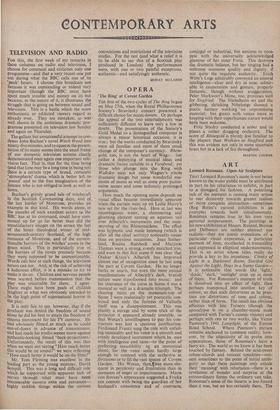OPERA
`The Ring' at Covent Garden THE first of the two cycles of The Ring began on May 27th, when the Royal Philharmonic Society's Stravinsky concert presented a difficult choice for music-lovers. Or perhaps the appeal of the two entertainments was sufficiently different to leave only a few in doubt. The presentation of the, Society's Gold Medal to a distinguished composer is always a minor historical occasion, it is true; but the works conducted by Stravinsky were all familiar and most of them small change of the composer's currency. Rhein- gold, too, is not the heart of Wagn.., but rather a deploying of musical ideas and dramatic forces suitable to a Vorabend; yet those whO plunge into the Ring with Walkilre miss not only Wagner's whole dramatic design but some wonderful mo- ments of music as well as some poor panto- mime scenes and some tediously prolonged arguments.
How much the opening scene depends on visual effect became immediately apparent when the curtain went up on Leslie Hurry's new set for the river-bed. Here at last was unambiguous water, a shimmering and gleaming element casting an aqueous veil over Alberich's movements and the man- oeuvring of the Rhinemaidens. The effect was hypnotic and made listening (which is after all the chief activity) noticeably easier than on previous occasions. Joan Suther- land, Rosina Raisbeck and Marjorie Thomas were a strong, evenly matched trio, and even in this first scene it was clear that Otakar Kraus's Alberich has improved almost out of recognition since he last sang the part at Covent Garden. He no longer barks or snarls, but even the most animal manifestations of Alberich's dark, brutish nature were transformed into music: and his Utterance of the curse in Scene 4 was a musical as well as a dramatic triumph. The clearing mists on the mountain-top of Scene 2 were realistically yet poetically con- trived and only the fortress of Valhalla itself was a disappointment. This was plainly a mirage and by some trick of the projector it appeared already unstable, so that Wotan's unwillingness to pay his con- tractors was lent a specious justification. Ferdinand Frantz sang the role with unfail- ing musicality and his voice is a smooth and evenly developed instrument which he uses with intelligence and taste—to the point of preferring inaudibility tq an unmusical shout, for the voice seems hardly large enough to contend with the orchestra at fortissimo or to fill the vast spaces of Covent Garden. His Wotan, then,Pas more elo- quent in perplexity and frustration than in moments of anger or imperiousness. Maria von Ilovsay's appearance suggested a Fricka not content with being the guardian of her husband's conscience and of contracts,
conjugal or industrial, but anxious to com- pete with the universally acknowledged
glamour of her sister Freia. This destroys the dramatic balance, but her singing had a welcome sensuous quality and dignity, if not quite the requisite authority. Erich Witte's Loge admirably conveyed an amoral intelligence—clear and dry in tone, admir- able in enunciation and gesture, properly fantastic, though without exaggeration. Peter Markwort's Mime, too, promises well for Siegfried. The Niebelheim set and the gibbering, shrieking Nibclungs showed a poetic fantasy working on unpromising material; but giants with voices more in keeping with their superhuman stature would have been welcome.
Fritz Sticdry conducted a sober and in places a rather dragging orchestra. The score of Rhinegold is plainly less familiar to the players than Walkiire or Siegfried and this was evident not only in some uncertain brass but in a lack of fire throughout.
MARTIN COOPER


































 Previous page
Previous page